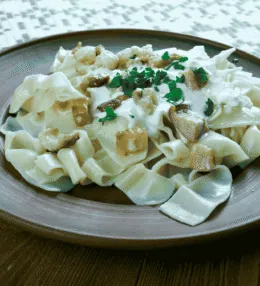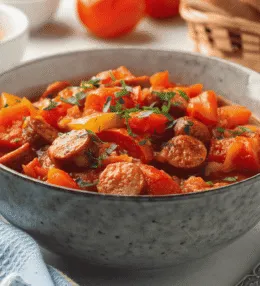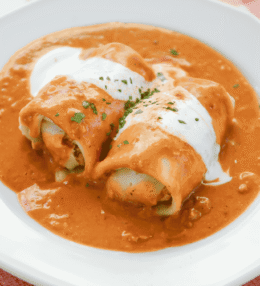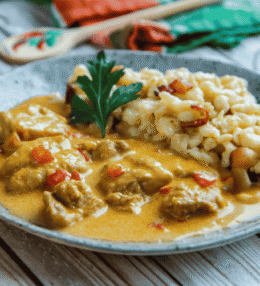
- View
Table of Contents
ToggleDuck à l’Orange is one of those iconic French dishes that manages to be both elegant and deeply comforting. The combination of rich, succulent duck with a vibrant, tangy orange sauce strikes a perfect balance between savoury and sweet.
It’s a dish that has long been associated with French fine dining, but its origins are humble, making it approachable and rewarding for home cooks as well.
Whether you’re preparing it for a special occasion or simply looking to explore classic French flavours, Duck à l’Orange is a dish that impresses with both its taste and its history.
Want to dive deeper into French Cuisine? Don’t miss our post on 21 Traditional French Foods to Try
What Is Duck à l’Orange?
Duck à l’Orange is a French dish that features roasted or seared duck served with a sauce made from orange juice, zest, and sometimes a splash of liqueur or wine.
The key to this dish lies in the harmony of flavours, the richness of the duck, with its crispy skin and tender meat, paired with the bright, slightly sweet citrus sauce. The result is a meal that feels indulgent yet balanced.
The duck is often roasted whole, or sometimes just the breast is used, depending on the preparation. The sauce is made separately, simmered with a combination of orange juice, stock, and a touch of vinegar to balance the sweetness.
Some versions of the dish include caramelizing sugar to add depth to the sauce, creating a rich glaze that complements the savoury qualities of the duck.
Ingredients and Taste
The ingredients in Duck à l’Orange are relatively simple, but each one plays a crucial role in creating the dish’s signature taste. The star, of course, is the duck, typically a whole duck or duck breast with the skin left on to render and crisp during cooking.
This gives the meat a rich, almost buttery texture that contrasts beautifully with the tangy orange sauce. The sauce itself is a blend of freshly squeezed orange juice, orange zest, and often a touch of Grand Marnier or white wine for extra depth.
A small amount of vinegar or lemon juice is often added to keep the sauce from being overly sweet, while sugar or honey can be used to enhance the natural sweetness of the oranges.
The combination of citrus and a subtle caramelization creates a sauce that is both sweet and tangy, with just enough acidity to cut through the richness of the duck.
When done well, Duck à l’Orange offers a delightful balance of textures and flavours: crispy, tender duck meets the smooth, velvety sauce with its bright, refreshing citrus notes.
The dish is often served with simple sides like roasted potatoes or seasonal vegetables, allowing the duck and orange flavours to remain the focus of the meal.
A Taste of History
Duck à l’Orange may seem like the height of French sophistication, but its origins are surprisingly humble. Some food historians trace it back to medieval Europe, where fruits were often used to balance the richness of meats.
The dish gained popularity in Franceduring the reign of Louis XIV, where elaborate meals featuring game meats were a common part of royal banquets. Over time, Duck à l’Orange became associated with French haute cuisine, thanks to its refined balance of sweet and savoury.
The use of oranges in the dish reflects the influence of Mediterranean trade on French cooking, as citrus fruits became more available in Europe during the Renaissance.
By the time the dish became widely known, it was already seen as a classic representation of the elegant, yet approachable style of French cuisine, balancing bold flavours with simplicity.

French Duck à l’Orange (Duck in Orange Sauce)
Ingredients
- 1 whole duck about 2 kg
- Salt and black pepper to taste
- 1 tsp ground cinnamon
- 1 tsp ground ginger
- 2 tbsp butter softened
- 3 large oranges juice and zest
- 2 tbsp orange marmalade
- 1 tbsp sugar
- 1/4 cup white wine vinegar
- 1/2 cup chicken broth
- 2 tbsp butter chilled and cut into small cubes
- 1 tbsp corn starch optional, for thickening
- Salt and black pepper to taste
Instructions
- Preheat your oven to 180°C (350°F). Pat the duck dry with paper towels, then rub it all over with the softened butter. In a small bowl, mix salt, black pepper, ground cinnamon, and ground ginger. Rub this spice mixture onto the duck, ensuring an even coating on both the outside and inside the cavity.
- Place the duck, breast side up, on a rack in a roasting pan. Pierce the skin all over with a fork to allow the fat to render out. Roast the duck in the preheated oven for 1.5 to 2 hours, basting occasionally with its own rendered fat. The skin should become crispy and golden, with the internal temperature reaching 74°C (165°F).
- While the duck is roasting, prepare the orange sauce. In a medium saucepan, combine the sugar and vinegar. Heat over medium-high until the sugar dissolves, then reduce the heat to low and let the mixture simmer until it reduces by half and becomes slightly syrupy.
- Add the orange juice and zest to the saucepan, followed by the orange marmalade and chicken broth. Stir well, then bring the sauce to a boil. Reduce heat to low and simmer for about 10-15 minutes, allowing the flavors to meld and the sauce to reduce slightly.
- If you'd like to thicken the sauce, mix 1 tablespoon of cornstarch with 2 tablespoons of cold water, then stir this slurry into the sauce. Simmer for a few more minutes until the sauce thickens to your desired consistency. Season with salt and black pepper to taste.
- Remove the saucepan from the heat and stir in the cold butter cubes, one at a time, whisking continuously. This will give the sauce a glossy finish and add a rich flavour. Keep the sauce warm on low heat while the duck finishes roasting.
- Once the duck is fully roasted, remove it from the oven and let it rest for about 10 minutes. This resting period helps retain the juices, ensuring a tender and succulent result. While resting, skim off any excess fat from the pan juices, and reserve a bit of the fat to drizzle over the duck before serving.
- Carve the duck into individual portions. Pour the warm orange sauce over the duck and serve immediately. Garnish with fresh orange slices or a sprinkling of additional orange zest for a bright citrusy presentation. Pair the dish with roasted potatoes or a simple green vegetable, such as haricots verts, to complement the rich flavours.
Nutrition
You May Also Like








